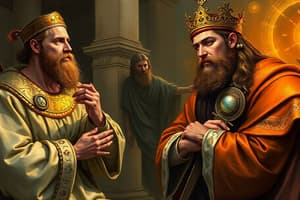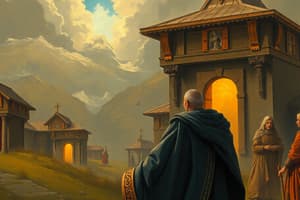Podcast
Questions and Answers
What was a significant outcome of the people's support for Luther's teachings?
What was a significant outcome of the people's support for Luther's teachings?
- It resulted in the decline of international trade
- It led to the establishment of a new feudal system
- It caused the Renaissance to come to an end
- It gave them the opportunity to demand more freedom from their rulers (correct)
Who proposed the heliocentric theory that challenged the geocentric view of the universe?
Who proposed the heliocentric theory that challenged the geocentric view of the universe?
- Newton
- Kepler
- Galileo
- Copernicus (correct)
What was a significant consequence of the Renaissance's focus on scientific and geographical discoveries?
What was a significant consequence of the Renaissance's focus on scientific and geographical discoveries?
- The end of the Renaissance era
- The decline of international trade and wealth
- The rise of a new feudal system
- The increased wealth and investment in science and technology (correct)
Which artist is known for incorporating scientific principles in artworks to showcase human anatomy?
Which artist is known for incorporating scientific principles in artworks to showcase human anatomy?
Which of the following is NOT a characteristic of the Renaissance?
Which of the following is NOT a characteristic of the Renaissance?
What was the outcome of the accumulated wealth and investment in science and technology during the Renaissance?
What was the outcome of the accumulated wealth and investment in science and technology during the Renaissance?
Who is credited with the first circumnavigation of the earth?
Who is credited with the first circumnavigation of the earth?
What was the significance of the Renaissance in terms of economic systems?
What was the significance of the Renaissance in terms of economic systems?
What does the term 'Renaissance' literally mean?
What does the term 'Renaissance' literally mean?
What marked the beginning of the spread of Humanist ideas in Europe?
What marked the beginning of the spread of Humanist ideas in Europe?
What was the central idea of Humanism in the 14th century?
What was the central idea of Humanism in the 14th century?
What was the first book published by Gutenberg?
What was the first book published by Gutenberg?
What was the outcome of the spirit of enquiry during the Renaissance?
What was the outcome of the spirit of enquiry during the Renaissance?
What was the religous transformation that took place during the Renaissance?
What was the religous transformation that took place during the Renaissance?
What was the key feature of the Renaissance that marked the end of the medieval period?
What was the key feature of the Renaissance that marked the end of the medieval period?
Which of the following authors promoted the renewal of traditional Greek and Roman culture and values?
Which of the following authors promoted the renewal of traditional Greek and Roman culture and values?
What was the primary goal of mercantilism in Europe between the 16th and 18th centuries?
What was the primary goal of mercantilism in Europe between the 16th and 18th centuries?
Who is credited with popularizing the concept of mercantilism in his book 'Wealth of Nations'?
Who is credited with popularizing the concept of mercantilism in his book 'Wealth of Nations'?
What was the primary focus of Humanism during the Renaissance?
What was the primary focus of Humanism during the Renaissance?
What was the result of the Protestant Reformation in Europe?
What was the result of the Protestant Reformation in Europe?
Who proposed the 95 Theses in 1517, marking the beginning of the Protestant Reformation?
Who proposed the 95 Theses in 1517, marking the beginning of the Protestant Reformation?
What was the primary reason why German rulers supported Martin Luther's reforms?
What was the primary reason why German rulers supported Martin Luther's reforms?
What was the Catholic Reformation also known as?
What was the Catholic Reformation also known as?
What was the significance of the Reformation in Europe?
What was the significance of the Reformation in Europe?
Flashcards are hidden until you start studying
Study Notes
Renaissance
- The Renaissance was a period of significant changes in Europe between the medieval and modern periods.
- It was characterized by a revival of literature, art, and intellectual pursuits based on Greco-Roman knowledge.
- The spirit of inquiry led to scientific inventions, and the emergence of nation-states replaced feudalism.
Art and Science
- Artists like Leonardo Da Vinci incorporated scientific principles into their artworks, showcasing human anatomy with precision.
- Scientists like Copernicus proposed the heliocentric theory, which stated that heavenly bodies revolve around the sun, not the earth.
- Galileo supported this theory with his telescope, and Kepler contributed with his theory of elliptical orbits.
- Notable voyagers like Ferdinand Magellan, Christopher Columbus, and Amerigo Vespucci explored new sea routes and expanded geographical knowledge.
Impact of Renaissance
- The Renaissance led to the discovery of new sea routes, rise of international trade, and new developments in arts, literature, science, and religion.
- Scientific and geographical discoveries improved shipbuilding and led to increased trade and wealth.
- This wealth was invested in science, technology, and the development of armies, leading to colonization and enslavement of new territories.
Humanism
- Humanism emerged in Italy in the 14th century, promoting the idea that man is the center of his own universe.
- Humanism emphasized education, classical arts, literature, and science, and led to the development of modern science and the Reformation.
- The invention of the printing press by John Gutenberg allowed for the spread of humanist ideas across Europe.
Mercantilism
- Mercantilism was an economic theory and practice that promoted governmental regulation of the economy to augment state power.
- It was popularized by Adam Smith in his book "The Wealth of Nations" in 1776.
Reformation
- The Reformation was another offshoot of the spirit of Humanism, which shifted the focus from the church to man and his needs.
- The Protestant Reformation resulted in a split in Christianity and the establishment of separate churches in various countries.
- The Catholic Reformation, or Counter-Reformation, led to reforms within the Roman Catholic Church.
Luther and the Protestant Revolution
- Martin Luther, a monk, proposed his 95 theses in 1517, rejecting the Catholic Church's hierarchy and emphasizing faith over pilgrimage.
- Luther introduced German as the language of church services, abolished the special status of priests, and supported the development of an independent German church.
- The German ruler and common people supported Luther, as they wanted to free themselves from the authority of the popes and gain control of the wealth in German monasteries.
Studying That Suits You
Use AI to generate personalized quizzes and flashcards to suit your learning preferences.




